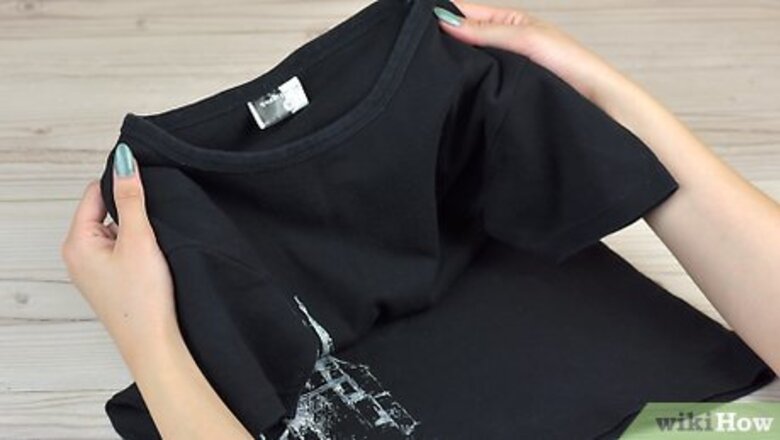
views
Cutting a No-Sew Face Mask
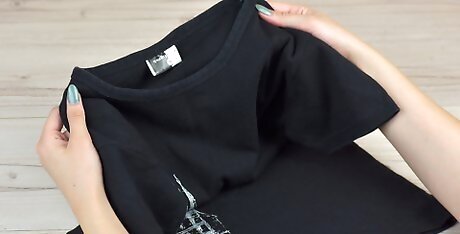
Get a clean, cotton T-shirt to cut out your face mask. So long as the shirt isn’t way too tight, you can use any T-shirt for this. Grab a clean shirt that you haven’t worn since you last washed it. Cotton is the best material for this style of mask.Tip: If you’re worried about protecting yourself during the coronavirus pandemic, this is your best option. This style of face mask is easy to wash and it’s easy to tie this mask to make it cover your nose and mouth completely.
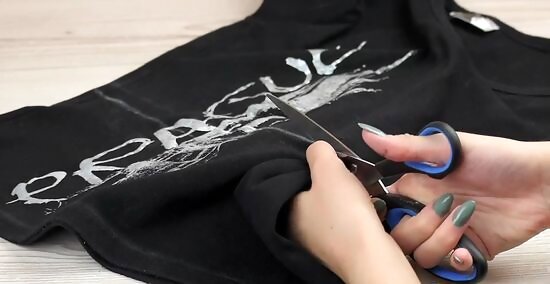
Cut out the bottom 7–8 inches (18–20 cm) of the shirt horizontally. Spread the shirt out flat on a table and smooth out any wrinkles with your palm. Grab a ruler and measure 7–8 inches (18–20 cm) up from the bottom of the waist. Cut horizontally across the shirt to turn the bottom portion of the shirt into a single loop of fabric. If you have a really sharp pair of scissors, you can use those. Otherwise, use fabric shears to cut your shirt. You may find it easier to cut the shirt if you have someone pull the shirt in opposite directions to pull the fabric taut while you cut. You can mark your cuts on each side with a marker or fabric pen if you’d like, but the cut doesn’t need to be perfectly straight.
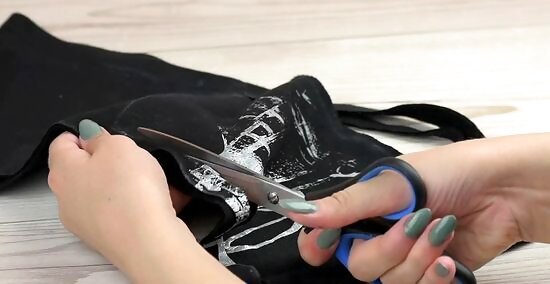
Trim a 6–7 in (15–18 cm) rectangle out of the shorter side. Keep the strip of fabric flat and measure 1–2 inches (2.5–5.1 cm) from the top of the fabric. Then, cut parallel to the long side of the fabric towards the other end of the shirt. Stop once you cut 6–7 inches (15–18 cm). Make a parallel cut on the bottom of the shirt. Then, cut vertically to connect these 2 cuts in the middle of the fabric and remove the rectangular piece. The 2 thinner strips of fabric are used to tie the shirt. The thicker portion of the mask is the part that goes on your face. If you’re struggling to visualize this, just imagine you’re cutting a small rectangle out of 1 side of the larger piece of fabric.
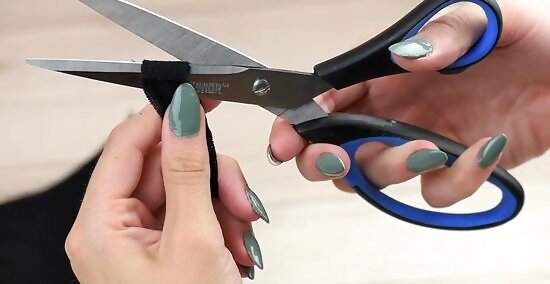
Cut the straps vertically at the point furthest from the uncut fabric. Adjust the remaining fabric as needed so that the 2 sides of the face cover are lined up with one another. Smooth the 2 straps down and cut them vertically at the point furthest from the main portion of the mask. Cutting the straps makes it easier to tie the mask as tight as you need it to be.
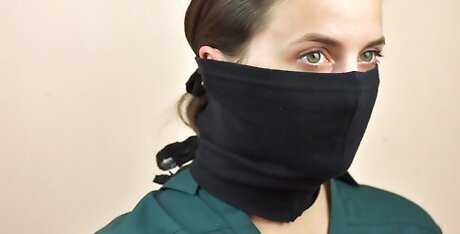
Tie the straps behind your head to put the mask on. To put your mask on, lift the top straps up and line the cloth up so that it covers your nostrils and mouth. Tie the top straps over your ears to keep the fabric tight against the bridge of your nose. Then, pull the bottom straps under your ears and tie them tight so that the fabric rests against your chin and covers your mouth. Always wash your mask after each use. You can wash it by hand or in a washing machine with cold water. When you put the mask on or take it off, do not touch the large piece of fabric touching your face. This will transfer any germs or bacteria from your hands to the mask and vice versa. Always use the straps to put the mask on or take it off. Before putting the mask on, wash your hands with soap and water for at least 20 seconds. Do the same after you take the mask off.
Crafting an Easy Face Cover with One Cut
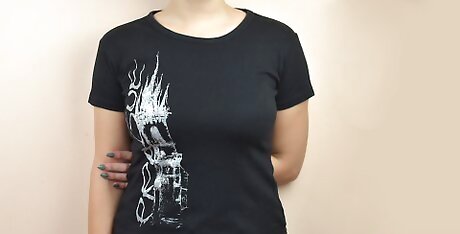
Find a clean T-shirt that fits you perfectly. This mask is extremely easy to make, but it does require a shirt that fits nearly perfectly. Cotton is the best material for this, but you can theoretically use any type of shirt that you’d like. It also needs to be clean, so wash the shirt if you recently wore it.Tip: If the T-shirt is too big, this style of mask won’t stay on your face. If it’s too tight, it will press your nose down when you wear it and you won’t be comfortable. This style of face cover won’t offer much protection for others since there will be gaps at the bottom of the mask, but it’s easily the quickest option if you need a quick mask. It’s also a great option if you have a good hat but can’t find your scarf, since it will cover everything below your nose and keep you warm.
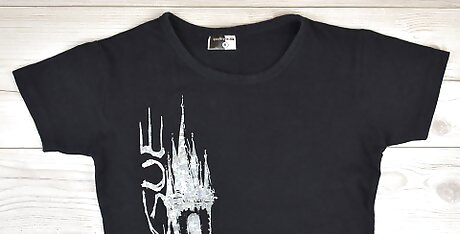
Lay the shirt out flat with the sleeves spread out. Set your shirt down flat on a table. Smooth any wrinkles out with the palm of your hand and grab some fabric shears. You can also use a regular sharp pair of scissors if the shirt isn’t particularly thick.
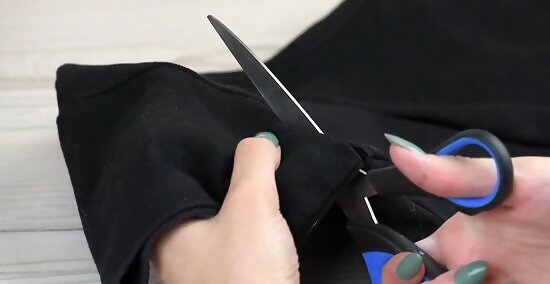
Cut a sleeve out by trimming around the seam where it attaches to the shirt. Slide your scissors around both layers of the shirt 2–3 inches (5.1–7.6 cm) below the armpit. Point your blades towards the collar and begin cutting both sides at the same time. Trim the sleeve off of the shirt by cutting in a circle towards the shoulder. if you want a really baggy face mask, start the cut 4–6 inches (10–15 cm) under the armpit. You now have a single loop of fabric. It doesn’t matter which sleeve you use. They’re symmetrical, so the mask will be the same either way. Since you’re already making 1 mask, you might as well make a backup with the other sleeve if you think it may come in handy later!
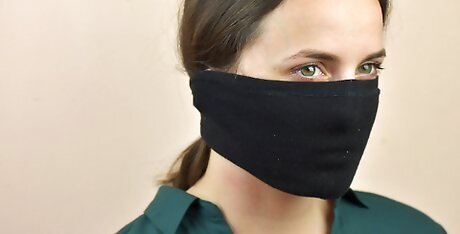
Slide the sleeve over your head to make a simple cloth mask. To put the mask on, hold the mask by the line you cut. Spread it out over your head and pull it down until the end of the sleeve is resting horizontally around the bridge of your nose.
Folding a Balaclava
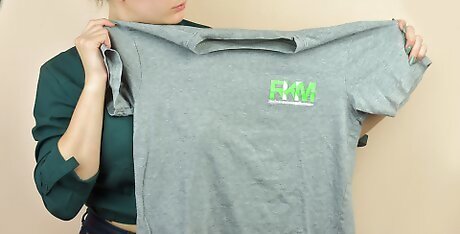
Pick a big T-shirt or long-sleeved shirt to make your balaclava. For a balaclava-style mask, grab a clean cotton shirt. It will be easier to tie the shirt if It is a little big on you and a long-sleeved shirt will make tying it a breeze. This mask is perfect for a ninja costume, but it will also give you the most privacy possible if you’re going out in public. This is likely the best choice if you’re trying to stay warm as well. Balaclava is a Russian term for a type of head covering where only your eyes are exposed. It’s a little different from a ski mask, where there’s an opening for your mouth. If you use a long-sleeved shirt, you will have 2 pieces of sleeve hanging down from the back by the time you’re done. If you don’t want anything hanging off of your mask, use a short-sleeved shirt. This is one of the few mask designs that doesn’t involve cutting anything. You will be able to re-wear your shirt after you do this.
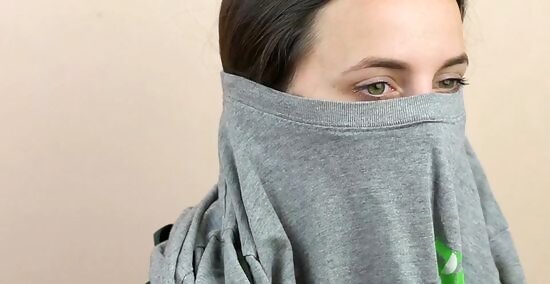
Slide the collar over your head and leave it on the bridge of your nose. Take the shirt and turn it so you’re holding it the same way you’d normally put It on. Pull the shirt over your head and pull the collar down until it’s resting on the bridge of your nose. Slide both sides of the collar over your ears to hold it in place. Let the rest of the shirt rest around your shoulders and pull the sleeves out to the side. If the collar is tight on your head, you don’t need to slide the sides over your ears.
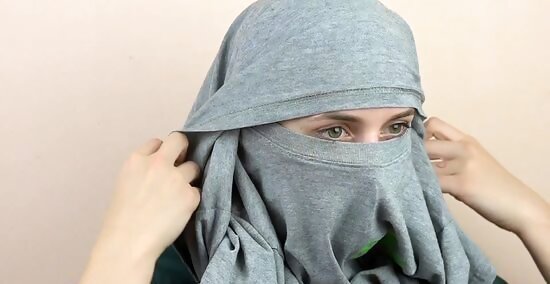
Roll the back of the shirt up and slide it over your brow line. Reach behind you and crumple the back of your shirt up to the base of your neck like an accordion. Then, slide the back of the shirt up over your head so that the shirt’s waistline is resting just above your eyebrows.Tip: If you don’t crumple the shirt up, part of the fabric may slide down and you’ll end up with a weird tail sticking out the back of your face cover.
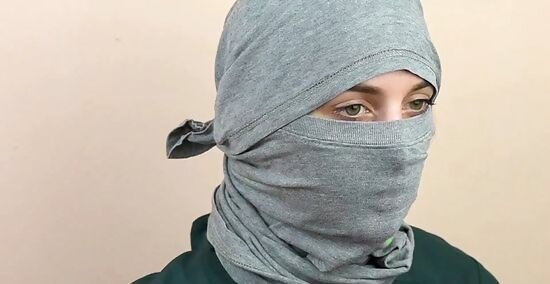
Pull the sleeves tight and tie them behind your head. Carefully pull each sleeve out away from you without disrupting the rest of the shirt. Roll each sleeve up 1-2 times in either direction and pull them back behind your head. Tie the sleeves together in a knot to secure the balaclava to your head. If you find it hard to tie the sleeves because you don’t have enough fabric to work with, get a bigger T-shirt. This style of mask won’t offer as much protection from dangerous viruses since it will tend to come loose the longer you wear it. Wash your shirt after wearing it as a balaclava. Even if you are just wearing it as a costume, there may be bacteria or germs built up on the fabric.




















Comments
0 comment